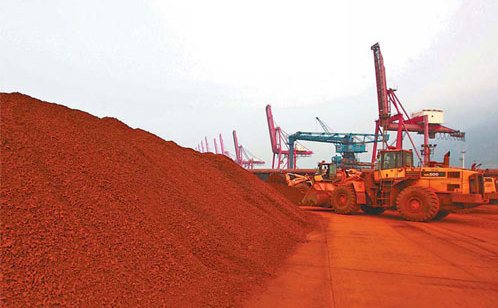Little change to rare earth quotas
|
Rare earth ores at a port in Lianyungang, Jiangsu province. The Ministry of Commerce said the export quota for the second batch of rare earths this year is 9,770 metric tons, taking the overall quota to 30,996 tons, up 2.7 percent from last year. Wu He / For China Daily |
Ministry grants second batch of export rights to 24 companies
China has made little change to this year's rare earth export quotas from 2011, in order to help maintain stable international market demand and supplies.
A Ministry of Commerce statement said the second batch of rare earth export quotas for this year is 9,770 metric tons, making the overall quota 30,996 tons, up 2.7 percent from last year. Of them, 8,537 tons are light rare earths and 1,233 tons are medium and heavy rare earths.
Quotas were given to 24 companies qualified to export rare earths. China's biggest producer, Baotou Steel Rare-Earth Hi-tech Co was given the largest amount, with 2,469 tons for light rare earths and 196 tons for medium and heavy rare earths.
Aluminum Corp of China got an export quota of 181 tons for light rare earths and 55 tons for heavy rare earth metals, while China Minmetals Corp received a quota of 423 tons for light rare earths and 152 tons for heavy rare earths.
Xi'an Xijun New Materials Co Ltd, a privately owned company, is on the list for the first time.
The quota system has sparked controversy as actual exports have been lower and therefore many quotas have been "wasted", industry experts said.
Exports of the limited resources have declined since the introduction of quotas and tariffs. In 2011, actual exports were 18,600 tons, with only 61 percent of the quotas granted.
Exports of rare earth minerals and metals in the first seven months of this year fell 36.7 percent to 21,729 tons, according to China Customs Statistics Information Center.
Rampant smuggling is considered the major reason for the decline in exports, in addition to sluggish demand caused by rising prices, overseas consumers' sufficient stockpiles and emerging foreign producers, said Ma Rongzhang, secretary of China Rare Earth Industry Association.
China has curbed output and exports of rare earths to conserve resources and protect the environment. But Japan, the world's biggest importer of rare earths, the United States and the European Union complained to the World Trade Organization about China's limits on exports in March.
Rare earths are 17 chemically similar elements that are used in items including flat-screen televisions, magnets and hybrid cars.
Media reports have indicated that the authorities and experts are discussing abolishing the current quota system and tariffs.
Due to the adoption of tariffs, the cost of using rare earths is about 20 percent higher for companies outside China, said Chen Zhanheng, vice-secretary-general of China Rare Earth Industry Association.
Although it is unlikely that the quota system will be abolished in the near future, Chen said quotas and tariffs could be cancelled if matching policies were in place to ensure the market is not affected.
He said the cancellation of the quota system could lead to a sharp global price drop and therefore hurt the development of new plants outside the country.
"China satisfying 90 percent of global demand is a very heavy task," Chen said.
He suggested raising the resource tax in China to maintain a stable price range and encourage suppliers from other countries to add new output.
With a large price increase in rare earths, major resource countries have adjusted their development policies. US' Molycorp Inc restarted production, Australia's Lynas Corp Ltd is likely to produce next year and Frontier Rare Earths Ltd of South Africa is also developing a rare earths project.

























